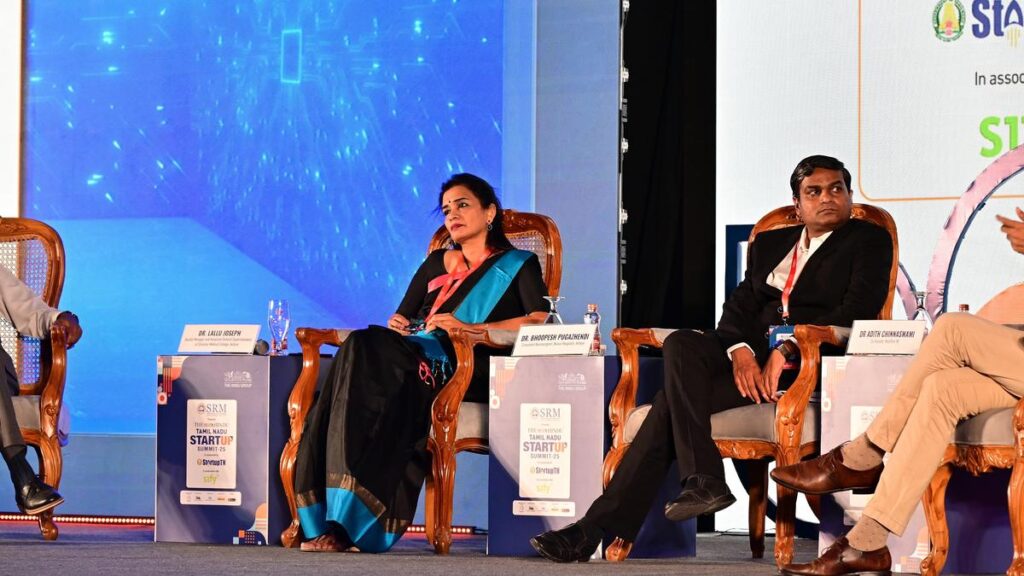
Panellists at the session on ‘Healthtech Innovations: Revolutionising Healthcare in Tamil Nadu’ held at the summit on Thursday.
| Photo Credit: B. VELANKANNI RAJ
Healthcare industry requires technology intervention at all levels — from patient care to maintaining hospital records and even a hospital’s functioning. The opportunities are many for the passionate. Often a personal setback or requirement triggers innovation and a start-up is born, said panellists at a session on ‘Healthtech Innovations: Revolutionising Healthcare in Tamil Nadu’ on Thursday.
The event was presented by The Hindu and SRM Institute of Science and Technology and co-presented by StartupTN in association with Sify Technologies.
Neurosurgeon K. Ganapathy, who moderated the session, recalled his days as a practising clinician, when advanced technology was non-existent. In his generation, students learned by practising on patients but today’s medical students could learn through simulation laboratories.
In fact, the National Medical Commission had mandated simulation laboratories, said Adith Chinnaswami, a laparoscopic surgeon and co-founder of MediSim VR. Boopesh Pugazhendi, consultant neurosurgeon at Naruvi Hospital, Vellore, said the hospital had gone paperless, a concept that patients and hospital staff equally found difficult to grasp. According to him, the challenge was training the hospital staff.
Lallu Joseph, quality manager and associate general superintendent at Christian Medical College, Vellore, recalled a personal experience to explain how healthcare innovations happen.
“Technology is transforming healthcare delivery. There are kids who are revolutionising healthcare,” she said, explaining how their passion for tracking race cars helped a couple of youngsters come up with contactless remote monitoring of vital parameters for their uncle who was being treated at the hospital.
Hospitals made it a practice now to install sensors under patients’ beds to monitor them. Use of apps to monitor workforce had improved patient satisfaction, she said.
Dr. Boopesh said clinical history taking in hospitals had undergone a transformation with the introduction of technology. The State government used technology to monitor the outbreak of diseases such as dengue and pneumonia. The high penetration of smartphones had helped the State monitor non-communicable diseases in the population, he added.
“It is more reverse engineering,” said Dr. Lallu about the digital transformation in healthcare. She urged youngsters to visit hospitals and see if their idea could solve a problem.
Dr. Ganapathy agreed that any innovator who showed evidence that technology could transform a service in the healthcare sector would receive support to develop their product.
Dr. Adith said now there were 250 students per MBBS class and with clinical material in short supply, virtual reality labs were an option to ensure that a healthcare professional could have a certifiable level of competency before starting to treat patients.
It is important to talk to persons who know the subject, said Dr. Ganapathy. Healthcare products must be clinically validated, and there are technicalities that a lay innovator may be unaware of.
Innovators could rope in doctors or hospitals to have their innovation tested. Their feedback would not only help fine-tune the product but also convince a funding agency to offer financial support, Dr. Lallu said.
Dr. Adith said simulation laboratories were welcome in medical colleges. “There was never any modality (to find out) whether a student knows how to handle an emergency. Now, we have one,” he said.
Published – April 25, 2025 12:44 am IST

